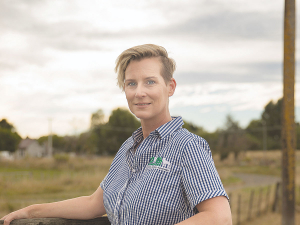Sheep Measles Spike: Farmers urged to strengthen control measures
Farmers are being urged to keep on top of measures to control Cysticerus ovis - or sheep measles - following a spike in infection rates.
 Michelle Simpson believe an important part of her role is helping spread the word about Ovis and that everyone has a part to play in protecting the sheep meat market.
Michelle Simpson believe an important part of her role is helping spread the word about Ovis and that everyone has a part to play in protecting the sheep meat market.
The Ovis Management programme, which works to promote control of sheep measles across New Zealand, has appointed a new project manager.
Michelle Simpson replaces Dan Lynch, who has retired after heading the programme for 28 years.
Simpson has a background in laboratory science, was formerly manager of the large animal department for Southern Rangitikei Veterinary Service and is married to a sheep and beef farmer. They live in Halcombe in the Manawatū.
"Sheep measles poses no risk to human health but causes blemishes in sheep meat, which is undesirable for consumers - particularly for the export market," she explains.
"It costs farmers a lot of money due to condemned stock, so it is an important issue for the primary sector."
C. ovis (sheep measles) is caused by the Taenia ovis tapeworm. Dogs can become infected by eating untreated meat or offal infected with live cysts. It is then spread to sheep through tapeworm eggs in dog faeces left in grazing areas. Eggs can also be spread from dog faeces over large areas, predominantly by flies.
The best practice for dog health and sheep measles is for all farm dogs to be treated with cestocidal (tapeworm) drugs containing the ingredient Praziquantel - a cheap and effective treatment - and an All Wormer every three months.
"A frequent issue with Ovis is that if a farmer is not sending in lambs for procesing, they may not know that they are passing the problem on," Simpson says. "Then, when a farmer ends up with issues with their product, they don't know who to turn to."
She believes that an important part of her role is helping those farmers to spread the word, that everyone has a part to play in protecting the sheep meat market.
"It is important to get the message out there that all dog owners who take their dogs near farmland, or where sheep graze, must dose their dogs every month."
Simpson says this is essential because the tapeworm has a short life cycle and dosing three-monthly is not enough to stop the parasite from spreading.
"Farmers and landowners can control who is coming onto their property with their dogs. It's your land, your livelihood, and your rules and if a dog does not need to come onto the property, then it is best not to have it there."
Simpson says she will be working with urban vet clinics, as well as rural ones, to further raise awareness of the importance of dosing dogs before they go into rural areas.
"Most urban dog owners are unlikely to know about the risk of Ovis, so it's about getting the message out that we all have a part to play."
The Meat Industry Association of New Zealand (MIA) today announced that Chief Executive Officer Sirma Karapeeva has resigned from the role.
The winners of the 2026 Hawke’s Bay/Wairarapa Dairy Industry Awards were announced at the annual awards dinner held at Copthorne Solway Park in Masterton on Thursday evening.
Environment Southland is welcoming this week’s decision by the Environmental Protection Authority (EPA) to approve the release of Blaptea elguetai, a leaf‑feeding beetle that will help control the highly invasive Chilean flame creeper.
This March, the potato industry is proudly celebrating International Women’s Day on 8 March alongside the International Year of the Woman Farmer, recognising the vital role women play across every part of the sector — from paddocks and packhouses to research, leadership, and innovation.
Fruit trader Seeka posted a record profit and returns to shareholders in 2025.
Recent weather events in the Bay of Plenty, Gisborne/Tairawhiti, and Canterbury have been declared a medium-scale adverse event.

OPINION: A mate of yours truly reckons rural Manawatu families are the latest to suffer under what he calls the…
OPINION: If old Winston Peters thinks building trade relations with new nations, such as India, isn't a necessary investment in…